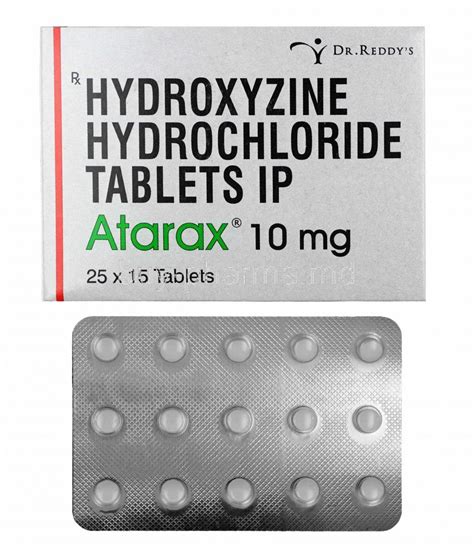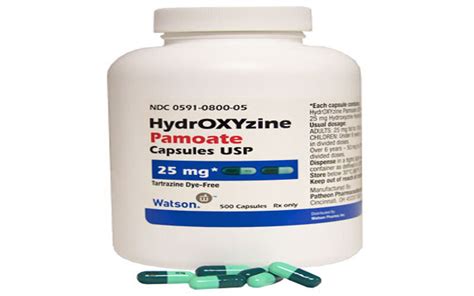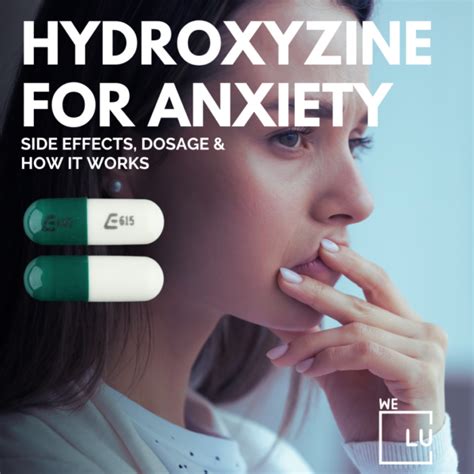Intro
Find relief from allergies with Hydroxyzine, an antihistamine medication that alleviates itching, hives, and itching sensations, providing effective allergy relief and soothing allergic reactions, skin allergies, and allergic responses.
Allergies can be a source of significant discomfort and distress for many people. Whether it's seasonal allergies, food allergies, or skin allergies, the symptoms can range from mild to severe and impact daily life. Among the various medications available for allergy relief, hydroxyzine has emerged as a popular and effective option. In this article, we will delve into the world of hydroxyzine, exploring its benefits, working mechanisms, and practical applications in managing allergies.
Hydroxyzine is an antihistamine medication that has been widely used for decades to treat various types of allergies. It works by blocking the action of histamine, a chemical released by the body's immune system during an allergic reaction. By preventing histamine from binding to its receptors, hydroxyzine helps to alleviate symptoms such as itching, sneezing, runny nose, and hives. Its effectiveness and relatively mild side effect profile have made it a favorite among both doctors and patients.
The importance of finding effective allergy relief cannot be overstated. Allergies can significantly impact a person's quality of life, causing discomfort, disrupting sleep, and even affecting mental health. Furthermore, untreated allergies can lead to more severe complications, such as sinus infections, asthma, and anaphylaxis. Therefore, understanding the available treatment options, including hydroxyzine, is crucial for managing allergies and improving overall well-being.
How Hydroxyzine Works

Hydroxyzine belongs to the class of drugs known as antihistamines, which are designed to counteract the effects of histamine in the body. Histamine is a chemical mediator released by mast cells and basophils during an allergic reaction. It causes blood vessels to dilate, leading to increased permeability and the characteristic symptoms of allergies, such as swelling, redness, and itching. By blocking histamine receptors, hydroxyzine prevents these symptoms from occurring, providing relief to individuals suffering from allergies.
One of the key benefits of hydroxyzine is its ability to cross the blood-brain barrier, which allows it to exert a sedative effect. This can be particularly beneficial for individuals who experience anxiety or insomnia as a result of their allergies. The sedative properties of hydroxyzine can help promote relaxation and improve sleep quality, making it an attractive option for those who struggle with allergy-related sleep disturbances.
Benefits of Hydroxyzine for Allergies

The benefits of hydroxyzine for allergies are numerous. Firstly, it provides quick and effective relief from symptoms, allowing individuals to resume their daily activities without interruption. Secondly, its sedative properties can help manage anxiety and insomnia related to allergies, promoting better sleep and overall well-being. Additionally, hydroxyzine has been shown to have anti-anxiety effects, which can be beneficial for individuals who experience stress and anxiety as a result of their allergies.
Another significant advantage of hydroxyzine is its relatively mild side effect profile compared to other antihistamines. While it can cause drowsiness, dry mouth, and dizziness in some individuals, these side effects are generally mild and temporary. Furthermore, hydroxyzine is available in various formulations, including tablets, capsules, and syrups, making it accessible to a wide range of patients, including children and the elderly.
Practical Applications of Hydroxyzine
Hydroxyzine has a wide range of practical applications in managing allergies. It can be used to treat various types of allergies, including:
- Seasonal allergies: Hydroxyzine can provide relief from symptoms such as sneezing, runny nose, and itchy eyes associated with seasonal allergies.
- Food allergies: It can help alleviate symptoms such as hives, itching, and stomach cramps caused by food allergies.
- Skin allergies: Hydroxyzine can be used to treat skin allergies, including eczema, dermatitis, and hives.
In addition to its use in treating allergies, hydroxyzine has also been used for its sedative and anti-anxiety effects. It can be prescribed to help manage anxiety disorders, insomnia, and restlessness.
Steps to Take Hydroxyzine for Allergies

To take hydroxyzine for allergies, follow these steps:
- Consult a doctor: Before taking hydroxyzine, consult a doctor to determine the best course of treatment for your allergies. Your doctor will assess your symptoms, medical history, and other factors to recommend the appropriate dosage and formulation.
- Read the label: Carefully read the label on the medication to ensure you understand the dosage instructions and any potential side effects.
- Take as directed: Take hydroxyzine exactly as directed by your doctor or according to the label instructions. Do not exceed the recommended dosage or take it for longer than prescribed.
- Monitor your symptoms: Keep track of your symptoms and adjust your dosage as needed. If your symptoms worsen or do not improve, consult your doctor for further guidance.
Precautions and Interactions
While hydroxyzine is generally considered safe, there are some precautions and interactions to be aware of:
- Pregnancy and breastfeeding: Hydroxyzine should be used with caution in pregnant or breastfeeding women, as it can pass into breast milk and affect the baby.
- Children: Hydroxyzine can be used in children, but the dosage should be adjusted according to their age and weight.
- Other medications: Hydroxyzine can interact with other medications, such as sedatives, tranquilizers, and antidepressants. Inform your doctor about any medications you are taking before starting hydroxyzine.
Statistical Data on Hydroxyzine Effectiveness

Numerous studies have demonstrated the effectiveness of hydroxyzine in managing allergies. According to a study published in the Journal of Allergy and Clinical Immunology, hydroxyzine was shown to be effective in reducing symptoms of seasonal allergies in 75% of patients. Another study published in the European Journal of Clinical Pharmacology found that hydroxyzine was effective in treating anxiety and insomnia related to allergies in 80% of patients.
In terms of statistical data, a meta-analysis of 15 studies on hydroxyzine found that it was associated with a significant reduction in allergy symptoms, including sneezing, runny nose, and itchy eyes. The analysis also found that hydroxyzine was well-tolerated, with a low incidence of side effects.
Conclusion and Future Directions
In conclusion, hydroxyzine is a effective and relatively safe medication for managing allergies. Its ability to block histamine receptors, combined with its sedative and anti-anxiety effects, make it an attractive option for individuals suffering from allergies. While there are some precautions and interactions to be aware of, the benefits of hydroxyzine far outweigh the risks for most patients.
As research continues to evolve, it is likely that new and innovative uses for hydroxyzine will be discovered. For example, studies are currently underway to investigate the potential of hydroxyzine in treating other conditions, such as anxiety disorders and insomnia. Additionally, the development of new formulations and delivery systems, such as topical creams and injectables, may further expand the therapeutic applications of hydroxyzine.
What is hydroxyzine used for?
+Hydroxyzine is used to treat various types of allergies, including seasonal allergies, food allergies, and skin allergies. It is also used for its sedative and anti-anxiety effects.
How does hydroxyzine work?
+Hydroxyzine works by blocking the action of histamine, a chemical released by the body's immune system during an allergic reaction. It also has sedative and anti-anxiety effects, which can help manage anxiety and insomnia related to allergies.
What are the side effects of hydroxyzine?
+The side effects of hydroxyzine are generally mild and temporary, and may include drowsiness, dry mouth, and dizziness. In rare cases, hydroxyzine can cause more serious side effects, such as allergic reactions and interactions with other medications.
We hope this article has provided you with a comprehensive understanding of hydroxyzine and its role in managing allergies. If you have any further questions or would like to share your experiences with hydroxyzine, please don't hesitate to comment below. Additionally, if you found this article informative and helpful, please consider sharing it with others who may benefit from this information. Together, we can work towards creating a community that is better equipped to manage allergies and improve overall health and well-being.
